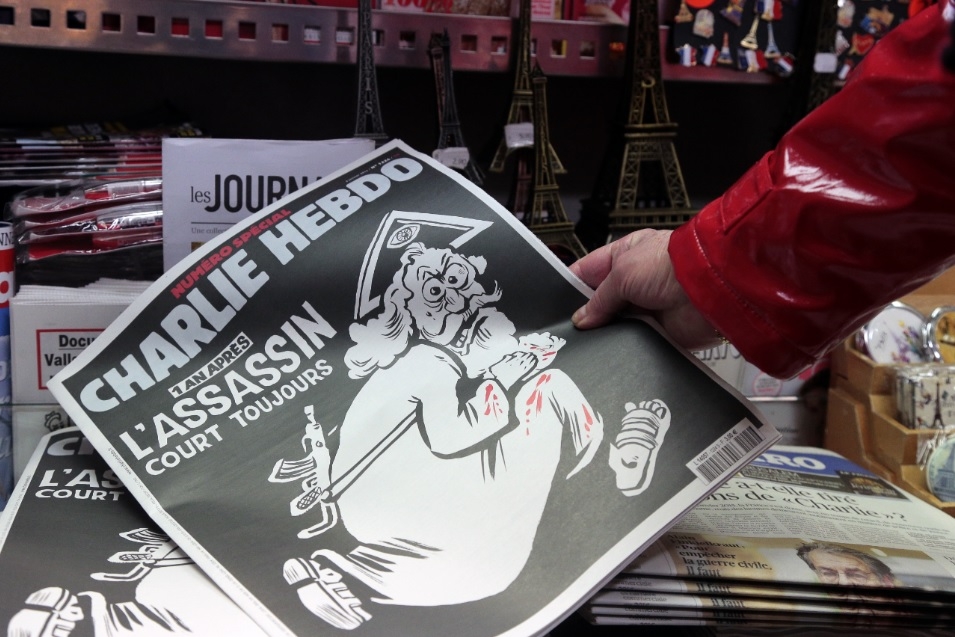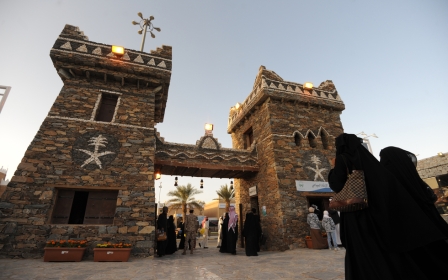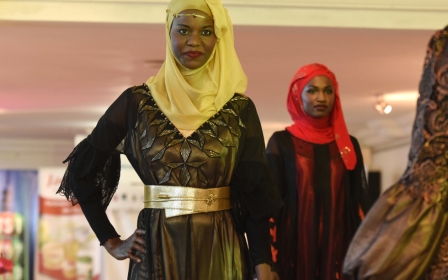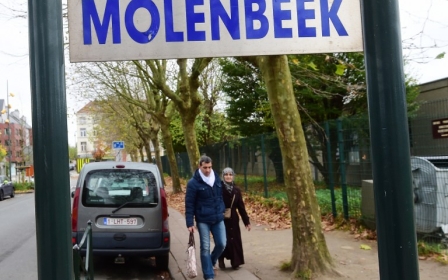Charlie Hebdo and the art of two-tier satire

Charlie Hebdo magazine is once again a victim. This time of its own reputation.
Since the attack on its offices in January 2015, propelling the satirical magazine to international prominence, "Charlie" as its French supporters like to call it, has had to live up to its "enfant terrible" reputation.
As a result it's had to consistently up the offending ante by lowering its comedic standards. While in the years that pre-dated the attack, the publication essentially targeted France's Muslim immigrant community, since being praised as the magazine that knew no limits and embraced the concept of offence, Charlie has had to continuously deliver in the offending department. And offend it did.
Attacking Muslims in France meant that the magazine gained support and was largely seen as the embodiment of "freedom of expression". The "Siné affair" however, where one of its veteran cartoonists was sacked for mocking the former president's son, soon revealed France's now notorious hypocritical approach to free speech.
Anti-Semitism
The magazine defended its right to insult Muslims or Islam yet a comment described as having "the potential of being interpreted" as anti-Semitic led to the dismissal of one of its star cartoonists.
But while crass cartoons of the Muslim prophet were met with the approval of France's entire political class and media glitterati, the "Siné affair" had to be rapidly swept under the carpet in a bid to maintain an image of a free and bold magazine that upheld the values of free speech.
It's worth noting however that in France, prior to the attack, Charlie was no longer a popular magazine, and was up until January of last year on the verge of bankruptcy. The support it gained from both a newly acquired readership as well as public funds meant that it was brought back in the black, though as it soon transpired, only temporarily.
The wave of support that immediately followed the massacre of its editorial team waned. Surfing on the sympathy factor, people bought the magazine. Soon however it was clear its material was no longer funny which was reflected in ever dwindling circulating figures.
But having received honours and awards for representing the heroic face of "freedom of expression," the crew has been keen to show it no longer discriminates in its ambitions to offend.
Shocking the Russians
In October last year a Russian passenger plane disintegrated in the air above the Sinai peninsula in Egypt killing all on board.
Charlie published two cartoons that shocked a Russia that had been particularly sympathetic towards the magazine following the January slaying.
The first drawing showed a passenger's skull, with the caption: "The dangers of Russian low cost" flights.
The second showed the plane's debris falling on a bearded fighter, with the legend: "The Russian air force is intensifying its air strikes."
Most people agreed it was crass and tasteless and the timing particularly insensitive as relatives were still hoping some passengers might have survived.
Alan Kurdi
With the drowning of Syrian toddler Alan Kurdi, Charlie lowered the bar once again forcing people to review their opinions on the once much-lauded magazine.
The cartoon showed a god-like figure joking that while Christians walk on water, Muslims drown in it. Another was the infant's remains lying on a beach with a giant placard of a McDonald's happy meal saying "two children's meals for the price of one".
Some core supporters insisted the magazine was mocking the consumerist nature of Western societies, while others said it denounced, in its own and very particular way, the suffering of the child.
But when incidents in Cologne in Germany involving North African men assaulting women on New Year's eve occurred, triggering a wave of racist debates across the media, Charlie scraped the barrel once again, with a cartoon that now openly promoted racism.
It portrayed a grown-up Kurdi lecherously chasing European women with the caption "what Aylan would have grown into".
For all their efforts, Charlie's increasingly small number of supporters were unable to defend the latest drawings, insisting instead that it was the Charlie "spirit" and that in essence the "satirical" magazine's ambition was always to shock, irrespective of how tasteless its content could be.
'Belgians in shock'
Last week, following on from the attacks in Brussels, Charlie proved that taste and basic decency were very obviously divorced from its core principles.
Belgium woke up "profoundly hurt" was one local newspaper headline. "Belgians in shock," said another. It's true that after Paris, Brussels with its sizable Francophone Walloon community had the second largest solidarity march in support of the assassinated journalists and "freedom of expression". Thousands of Belgians came out onto the streets of the capital brandishing the now infamous black placard "Je suis Charlie".
But Charlie's response to Belgium's atrocity brought the questionably satirical magazine to new astonishing depths.
The cartoon in question shows a young man's face surrounded by various human limbs with the caption "papoutai" with the Belgian flag as a background.
Mocking dismembered bodies, following an attack with explosives, is crass enough but upon closer inspection, the cartoon is far more depraved than it originally appears.
The young man is Belgian singer Stromae, whose hit Alors on Danse made him an instant star. His success was followed by a second album with another striking song Papaoutai.
Papoutai is a spirited tune that invokes sub-Saharan celebratory music, but listening more carefully to the lyrics and it reveals the singer's incredibly moving story.
Stromae's father was from Rwanda. He was killed during the 1994 Rwanda genocide and his body was later found having been cut in pieces. "Papoutai" or "Papa ou t'es" is French for "Dad where are you?" and his hit was the singer's cathartic way of speaking about his absent father who met a gruesome end.
The cartoon was understandably badly received and the voices of support for Charlie are today increasingly muted.
Having shocked even its traditional supporters, Charlie Hebdo's editorial team decided this week to publish an article that will undoubtedly recapture some of that lost love.
Blame Brussels attack on all Muslims
In it, the magazine insidiously pins the blame of the Brussels attack on the Muslim community as a whole, and the supposed self-censorship Western societies impose on themselves by not daring to speak about the religion and its adherents.
So Charlie Hebdo, which proudly presents itself as having no limits on any topic, is now claiming it holds back on the sensitive issue of Islam while most of its material for the past decade has been about Islam. Much like the numerous commentators who deplore the "politically correct" climate that limits the discourse on Islam all the while speaking about nothing other than Islam at any given opportunity.
After upsetting its once core support base, Charlie has returned to the one topic that sells, and has done it in a particularly inflammatory way. As many commentators have recently observed, it will no doubt regain those temporarily lost friends.
It is interesting to review the reactions to Charlie Hebdo's now well-documented crass attempts at humour. With the "jokes" on the Russian plane came a wave of protestation that would have been denounced in the past as an attempt to stifle free speech.
Mocking Rabaa massacre
After the Rabaa massacre in Cairo in 2013 Charlie draw a Muslim Brotherhood member holding a bullet-ridden copy of the Koran in front of his chest with the caption "this book is **** - it doesn't protect you from bullets".
Mocking pious Muslims for believing in god-like protection as well as a mass killing, the cartoon was naturally seen as offensive.
However after the slaughter of its journalists, a spoof of the aforementioned cartoon emerged on social media showing Charb, Charlie's most recognisable cartoonist and editor in chief, holding a copy of a bullet-ridden edition of the magazine with the exact same caption: the teenager who posted it on his Facebook account was consequently arrested.
As it turned out everyone found Charlie's cartoons on Muslims entertaining and funny until of course they bore the brunt of its very particular brand of humour.
In that respect, Charlie Hebdo has in infamy perhaps provided world opinion with one invaluable lesson: everyone appears to have a sense of humour... until they are the butt of the joke.
- Hafsa Kara-Mustapha is a journalist, political analyst and commentator with a special focus on the Middle East and Africa. She has worked for the FT group and Reuters and her work has been published in the Middle East magazine, Jane's Foreign report and a host of international publications. A regular pundit on TV and radio, Hafsa can regularly be seen on RT and Press TV.
The views expressed in this article belong to the author and do not necessarily reflect the editorial policy of Middle East Eye.
Photo: A woman looks at the special commemorative edition of French satirical newspaper Charlie Hebdo at a newsstand in Paris on 6 January, 2016, to mark the one-year anniversary of the attack that claimed the lives of 12 people, including three of its best-known cartoonists (AFP).
New MEE newsletter: Jerusalem Dispatch
Sign up to get the latest insights and analysis on Israel-Palestine, alongside Turkey Unpacked and other MEE newsletters
Middle East Eye delivers independent and unrivalled coverage and analysis of the Middle East, North Africa and beyond. To learn more about republishing this content and the associated fees, please fill out this form. More about MEE can be found here.





